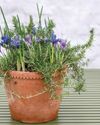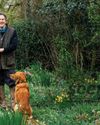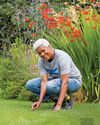
They moved to this large site in 2005, but Helen wasn't able to start creating her garden until 2012, once the main construction work was complete.
The garden sits in two acres of land surrounding the house, with the rest of the site left to nature. Helen takes a natural approach to all of the garden, with plants allowed to self-seed. She also has a real passion for wildlife.
What was the garden like when you moved in?
There were just a few veg patches around the old cottage, and a few tin sheds. The previous owner only grew potatoes - we had a massive crop that first year! There was couch grass everywhere, so I had to wash the roots of everything I wanted to keep, to remove the couch grass from the garden. It was pretty much carnage to start with.
What did you do to transform the garden?
The site was full of stones, as it used to be a quarry, so every time you put your fork in the ground, you hit a stone. A friend showed me how to build dry stone walls and I caught the bug. I never thought I'd become obsessed with finding the perfect stone! I've moved barrowloads around the site. The walls level out some areas and hold back the land.
I kept all the plants that were here, apart from the couch grass, and divided them to get as many plants as possible for free. I sowed a lot myself too, and visited a local garden centre at the start.
I have such a love for nature, thanks to my father who took me on walks as a child. I have a real passion for plants too, I salivate walking past a garden centre! So it was an obsessive need, to create my garden. The garden also has to work with the weather - plants need to survive full sun, heavy rain and strong winds. I encourage them to self-seed, then move them around. This wasn't a garden you could mastermind, because at the start I couldn't see beyond the mess that was there in front of me.
This story is from the {{IssueName}} edition of {{MagazineName}}.
Start your 7-day Magzter GOLD free trial to access thousands of curated premium stories, and 9,000+ magazines and newspapers.
Already a subscriber ? Sign In
This story is from the {{IssueName}} edition of {{MagazineName}}.
Start your 7-day Magzter GOLD free trial to access thousands of curated premium stories, and 9,000+ magazines and newspapers.
Already a subscriber? Sign In

Tales from Titchmarsh
Tending the land is a rewarding if undervalued career, and it's also the best way to safeguard our future on this planet 'Same old, same old...' is a phrase that sends a shiver down my spine. Friends who have hoed the same furrow (pardon the gardening analogy) year after year in a job that pays the rent but which they do not like have my deepest sympathy.

Container of the month
Mark fresh beginnings with a hit of colour, combining bright evergreens and early risers

Boost your wellness the natural way
Gardening is good for you! Six inspiring experts reveal how getting your hands into soil, growing beneficial plants and connecting with nature can transform all aspects of your health.

Potting on a winter show PART 2
Nick Bailey banishes January blues with a sophisticated container display that's guaranteed to lift the spirits

Winter scents
Fragrant flowers can help lift the spirits on cold winter days. Monty shares his favourite plants to fill the garden with olfactory joy

Growing THE GOOD LIFE
If you've always wanted your own mini farm, let urban smallholder Sara Ward show you how

Arit's 7 deadly sins
Discover Arit Anderson's guilty gardening secrets and how you can turn your own sins into wins

Garden globetrotting
Desert Botanical Garden, Phoenix Garden globetrotting Fancy a new look for your plot or just want to try something different? Our new series about gardens around the world could be just the ticket. This month, Matt Collins reveals what captured his heart in Arizona

10 nature-led ways to feed birds
Want to give wild birds a natural boost this winter? Kate Bradbury explains how to attract a wide diversity of birds to forage within your garden and why this is so beneficial

A new plot for tasty crops
Taking on a new allotment needn't be hard work. By simply following a few easy tips you can have bumper crops in no time, just like Alessandro Vitale